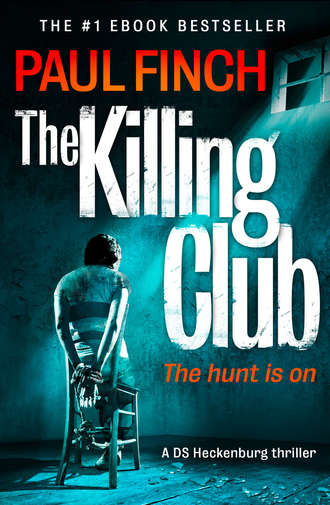
Полная версия
The Killing Club
‘For all the trouble you’ve put me to, sergeant,’ he said, ‘I still regret this. You were a worthier opponent than the others. Please take that as a compliment.’
And he fired.
Or tried to. It was the aged, internally rusted mechanism that betrayed him. It detonated in his fist with a blinding blot of flame and a clung of rending metal.
Heck blinked and flinched as hot fragments scattered over him: splinters of scalding metal, and flecks of softer, wetter material. His heart almost skipped a beat as he lay there, but he was unhurt. Warily, he opened his eyes again – to find that Cooper was still on his feet, but white-faced, and glassy-eyed. Only slowly did he twist his head around to survey the smouldering lump of meat where his right hand had once been. Ironically, what remained of the gun was still present, dangling from his sole remaining finger, though that was more bone than flesh.
The knife fell to the floor with a clatter, but the shriek of agony rising in Cooper’s chest didn’t get a chance to erupt before Heck had sprung upright and rammed two heavy punches into his lower body. The third caught Cooper in the mouth, and knocked his head spinning.
‘I don’t often hit the afflicted,’ Heck said, circling as the guy tottered, and then firing in a fourth and a fifth blow, the latter hurling the gunman senseless to the ground. ‘But at least it’s the kind of firm response your dad would have appreciated.’
‘I guess I’m somewhat diminished in your eyes,’ Farthing said.
Heck glanced around. He stood by the garage door, sipping coffee from a paper beaker. His clothes were still damp, the palms of his hands stinging where they’d been skinned, though a couple of light dressings had since been applied. The factory yard was alive with radio static and filled with police vehicles, their blues and twos swirling in slow, lazy patterns. The ambulance carrying Ernest Cooper, now cuffed safely to one of DI Higginson’s oppos, pulled slowly away through the open double-gate. The DI herself followed in an unmarked car.
Farthing, still pale around the gills, clutched his hat to his belly – a vaguely sheepish gesture. His expression was tense, worried.
‘Diminished?’ Heck still had half an eye on the garage interior, where the firearms team, who, having made safe the bloody tangle of metal that had once been the Luger, had picked it up with a pair of forceps and were feeding it into a sterile sack.
‘Well if I’m not, I should be. I was shit scared.’
‘You think I wasn’t?’ Heck replied.
‘Aye … but you kept it together. Me … I just sat there, like.’ Farthing’s cheeks reddened. ‘Didn’t know what to do. Just sat there, waiting for it.’
Heck shrugged. ‘You were tired … and you weren’t feeling so good.’
‘That’s another thing. There was nothing wrong with me.’
He let that point hang, waiting nervously for Heck’s response – which, when it came, was no more than a raised eyebrow.
‘I know I’m not fit,’ Farthing said. ‘Let’s face it, I’m a fat bastard … I couldn’t have run much longer. But I wasn’t having a heart attack. I was just paralysed with fear. I’d have done anything to get you to take the risk … while I sat it out.’
Heck shrugged again. ‘My head was scrambled too. I’d already figured he couldn’t see very well. I mentioned that his gun was probably kaput … the odds would likely have been better if I’d just taken him on.’
‘What a thought.’ Farthing shuddered – he’d already vomited once, not long after support units had arrived; briefly, Heck thought he was going to do it again. ‘Taken him on? A madman like him?’
‘It’s about survival,’ Heck said. ‘If you’re worried you let me down, Jerry, you didn’t. Your wife and daughters are more important to you than I am … course they are. No one would argue with that.’
‘That’s the other thing.’ Now Farthing really did avert his gaze. ‘I haven’t got a wife and daughters. Haven’t even got a girlfriend. I mean, face it … who’d have me?’
Heck regarded him long and hard, too tired to voice the brief, fierce annoyance he suddenly felt.
Farthing shrugged as he watched the ground, shuffling his feet. ‘Might as well own up to it now. We’ll be living in each other’s pockets for the next few days, getting the story straight. Bulldog’ll be all over us …’
‘And I’d learn the truth from someone else?’ Heck said. ‘And as a result, I might inadvertently let it slip how you behaved back there? So even though you’re coming clean now, you’re not exactly doing it for honourable reasons, are you?’
But just as quickly as his anger had risen, it subsided again. Shouting and kicking-off would serve no purpose now. Plus he had no energy for it.
‘It was just chat,’ the PC added unnecessarily. ‘I was trying to save my own arse.’
‘Well … it worked. In a roundabout sort of way. Don’t knock it.’
‘I’m sorry, like.’
‘Let’s just say you owe me one.’
‘I’m sorry about something else too.’ Farthing blew out a long, weary breath. ‘Sorry that I don’t have anyone to go home to. First time I’ve ever thought that … just about now, that little house of mine is going to feel a bit empty.’
‘We’ve got our lives, haven’t we?’ Heck grunted. ‘Bloody hell, Jerry, we can’t expect everything.’
Chapter 5
It was another of those mid-September nights that left you in no doubt autumn had arrived. Darkness came early, and with the darkness an unseasonal chill. The trees were still in plumage, but strengthening winds rattled their dank branches, whipping their leaves, sending black, cavorting shadows along rain-damp city streets.
Heck saw none of this as he drove his white Citroën DS4 into the personnel car park at New Scotland Yard. He’d travelled all the way from Sunderland that afternoon without taking a break: nearly two hundred and fifty miles.
Sallow-faced and unshaved, wearing jeans, trainers and a sweatshirt, he made his way upstairs to the Serial Crimes Unit offices, which, as he’d expected at nine o’clock in the evening, were largely unmanned.
The first person he met was DCI Ben Kane, who, having recently been promoted from DI, was now second-in-command at SCU. While overall boss, DSU Gemma Piper, was engaged on other matters, he was currently running all day-to-day operations, including the delegation and supervision of routine assignments. He was a squat, bespectacled forty-year-old, whose sensible short hair, tweed jacket and chequered bow-tie gave him a nerdish air. Heck had always regarded Kane sceptically, thinking he seemed more like a teacher than a senior investigator in one of the Yard’s frontline units – his unofficial nickname in SCU was ‘Schoolmaster Ben’ – but on the upside, as deputy-gaffer, Kane’s role here was now mainly administrative, which meant he’d be out of their hair a lot more.
Kane was closing up his briefcase when he spotted Heck approaching along the central corridor. He regarded him quizzically. ‘You back already?’
Heck shrugged. ‘Cooper’s on remand, guv, awaiting trial … all my arrest papers are in. Job done.’
‘Yeah, I’ve read the file. Not your most straightforward arrest.’
‘No … got there in the end, though.’
‘This lad, Jerry Farthing. You’ll be on the witness stand with him. He up to it?’
In his arrest report, Heck had downplayed PC Farthing’s loss of control on the day in question, but there’d been no way to hide the Sunderland bobby’s ineptitude when it came to the cat-and-mouse game they’d been forced to play with Ernest Cooper, not to mention the actual arrest.
Heck shrugged again. ‘He’s a bit of a headcase, if I’m honest. Not sure he’s long for this job. But I’ve had a couple of sessions with him … to get the facts straight. Think he’ll be okay.’
Kane shoved his briefcase under his arm. ‘Do you always have to do things the hard way?’ It wasn’t as harsh a question as it sounded. Kane seemed genuinely fascinated to know.
‘We pull them in any way we can, guv. You know that.’
‘Well … Northumbria are happy. These are the results we want, I suppose. Well done.’
Kane nodded and continued down the corridor to the lifts. Heck slouched on through the department. One or two individuals were around, finishing paperwork, waiting on phone calls and such, but the Detectives’ Office, or ‘DO’ as SCU members preferred to call it, was deserted.
He humped his sports bag, currently stuffed with miscellaneous toiletries and unwashed clothing, over to his desk, dumped it in the aisle and slumped into his swivel chair, which, having moulded itself neatly to his buttocks over so many years, was such a relief that it induced an audible sigh.
Heck stretched, switched on his anglepoise lamp, then unlocked one of his lower drawers and rummaged through the bric-a-brac for the half-full bottle of Chivas Regal he usually kept in there. Grabbing a mug from the tea-making table behind, he was about to pour himself a couple of fingers when he noticed Gemma Piper leaning in the doorway.
‘Ma’am …’ he said, making to stand up.
Gemma gestured for him to sit. She looked as tired as he felt, which was not her normal form. Her top two buttons were undone, her sleeves rolled back to her elbows, one blouse flap hanging over the waistband of her skirt. She still looked good of course, but then she always looked good to Heck.
‘Dare I ask what you’re doing here?’ she said.
‘Well … I’m not needed back in the Northeast until the trial, so I thought I’d come home for a bit.’
She arched a pencil-thin eyebrow. ‘Heck … you consider this place home?’
‘It’s a bit functional, but SCU are the only family I’ve got, so … yeah.’
‘Bloody drama queen.’ She entered, suppressing a yawn. ‘Unfortunately, there’s only me here at present.’
‘Don’t worry, ma’am … you’ll do.’
‘You’ve already got a big sister, Heck.’
‘Who’s talking about a sister?’
She regarded him coolly, until he refocused on the whisky bottle, carefully unscrewing its lid.
He glanced up. ‘You mind?’
‘You’re off duty … why should I?’
‘Fancy one?’
‘I’m on duty, I’m afraid.’ Gemma leaned back against the facing desk, while he poured the golden spirit. ‘Sounds like we almost lost you?’
‘Nah, you’re not that lucky.’
She paused for a lengthy moment. ‘Want to talk about it?’
‘It’s okay. It’s just the streets.’ He sipped, unable to conceal the pleasure it gave him. ‘They get dicey.’
She nodded, respecting that. ‘So … Cooper’s banged to rights?’
‘Sure is, but I’ll be amazed if he doesn’t go down for diminished capacity.’
‘They’re already making that call, are they?’
‘No, but he’s evidently three sheets to the wind.’
‘You think?’
‘Do you want to know what I really think, ma’am?’ Heck sat back, puffed out his cheeks. ‘For the first time, I think it’s shades of grey.’
She frowned. ‘This case?’
‘This job. It happens more than we may realise. Some things about Ernie Cooper made him okay. He believed in decency, justice. He had that wartime generation attitude off pat …’
‘Except that he wasn’t of that generation. He just wished he was.’
‘Those guys he murdered were out-and-out scumbags.’
‘They were sadistic crimes, Heck. Cooper enjoyed killing those men … I read that in your own progress report. Plus it was premeditated. Plus he was going to kill you.’
‘I could have been the last casualty of World War Two,’ Heck mused, smiling at the curious thought.
Gemma smiled too – which was a rarity and a treat.
She was famous in the job for her good looks, but also for her efficient and authoritative manner. As head of SCU, Gemma didn’t tolerate fools or slackers. She ran an elite department, which alternately made her proud and frustrated. They were only as good as their worst failure, she would say. She didn’t like loose ends or open cases. She demanded regular results and hard work, but in return would defend her staff to the death if she felt they were in the right. All over Scotland Yard, they called her ‘the Lioness’ – as much for her willingness to scrap as for her wild blonde mane. Gemma didn’t mind that, so long as it was never to her face.
In the past, when they’d been junior detectives working together at Bethnal Green, she and Heck had been lovers. It seemed an age ago from his perspective, but he’d been in her proximity ever since, and it never ceased to enthuse him – in various ways. She drove him mad on occasion and their former relationship had never meant that she wouldn’t severely discipline him if necessary; but she set the standards he aspired to, and yet would still tolerate the instinct and imagination he brought to his investigations, because she also knew the value of those who thought outside the box.
In the words of Gemma’s own mother: ‘They were two peas in a pod; who on earth had thought it a good idea to shell them?’
‘You say you’re on duty,’ Heck said. ‘At this time?’
‘Rochester paperwork,’ she replied. ‘Interpol don’t keep the same hours we do.’
Heck tried not to let the mere mention of the name Peter Rochester – or Mad Mike Silver as he was more often known – ruffle his feathers. He poured more whisky, drank it in a gulp. ‘He may be in Gull Rock, but they say the lifers there get it easy these days.’
‘That isn’t true.’
‘I hear they’ve even given him a Malacca cane to walk around with. Like he’s some kind of plantation owner.’
‘He’s crippled,’ she said. ‘So he needs a stick. To deny him that would be to deny him his basic human rights.’
Heck snorted as he drained his mug. ‘Human rights … he’s lucky he wasn’t in Gull Rock fifty years ago, when it was all treadmills and whipping-posts.’
‘Take it from me, Heck, there isn’t much happens around Mad Mike Silver that has anything to do with luck.’
‘Is he still stonewalling you?’
‘What else?’
‘So he hasn’t even dropped any of the bit-players our way yet … like Jim Laycock for instance?’
‘Even if he had, which he hasn’t – because the Laycock link is a total non-starter, Heck – I wouldn’t tell you.’
‘And no leads on Nice Guys’ underbosses overseas? Nice Guys’ operational bases? Dumping grounds for Nice Guys’ victims in the Baltic, the Med, the Caspian …?’
‘Heck, stop … okay!’
‘Well, you know my feelings on Mad Mike …’
‘Course I do. Which is why you’re going nowhere near him. Ever again.’
Heck put his bottle away, took his mug to the sink and washed it. ‘We’re all law-abiding people in here, ma’am.’ He grabbed up the few bits of paperwork he’d actually come in for, and crammed them into his sports bag. ‘We have a system, and we stick to it. We respect all human life – that’s why we do what we do.’ He headed for the DO door, turning once before leaving. ‘But there are definitely times when a lamppost and a good piece of rope wouldn’t go amiss.’
Gemma let that pass, nodding as he waved goodbye and listening to his footfalls recede down the corridor. Eventually, after the lift doors had slid shut, she walked back to her own office, where she closed the door behind her and stood staring at the mobile phone on her desk. Waiting tensely for a call which, in all honesty, she hoped would never come.
Chapter 6
It was just before midnight on September 19 when alarm sirens began sounding through the concrete corridors of the medical wing at HM Prison Brancaster, amber lights flashing at each electronically sealed checkpoint, the wards going into lockdown as the officers’ hobnailed boots hammered up and down stairs and gangways.
Medical emergencies were not uncommon in a jail where the inmates were exclusively the most volatile and unstable in the penal system. Despite Gull Rock’s tough but on-the-whole progressive regime, violent assaults among prisoners were a daily event, suicides occurred with regularity, and homicides were not infrequent. On top of that, there was grave ill-health: STDs were transmitted widely, while drugs were still smuggled in and often led to ODs; there were also a number of older men housed there – full-term lifers now in their seventies and eighties.
The upshot was that, though medical staff responded swiftly and efficiently if they thought someone might die, staff from other parts of the prison almost never came running.
Until now.
Until word got around that the casualty on this occasion was Inmate 87156544, real name Peter Rochester, also known as ‘Mad Mike Silver’.
For quite some time, Peter Rochester had been Britain’s unofficial Public Enemy Number One, and where the tabloids were concerned, a hate-figure on a par with Osama bin Laden. Even the chattering classes, those who habitually attempted to grapple with the psychology of ultra-dangerous offenders rather than condemn them outright, had difficulty finding anything positive to say about him. The problem was Rochester’s intellect. He wasn’t some drooling madman; he wasn’t bipolar; he wasn’t schizophrenic; he didn’t have mummy issues. He was quite clearly a psychopath – but of the most organised and calculating variety. To start with he was aloof and confident, unfazed by the extreme emotions he aroused among his fellow inmates, amused by the frustrations of his captors. He could withstand the fiercest interrogations; he didn’t respond to threats, bribes or trickery, never giving anything away unless it served his purpose. As such, any information the authorities had accrued on Rochester was paper-thin. Even his basic background remained sketchy; his full list of criminal activities was incomplete, his catalogue of known associates empty. It was some considerable time after he was first incarcerated before the British police were even able to establish his true identity.
Rochester, it was now known, was a British national, a native of the Home Counties, who, having been rejected by the British Army on medical grounds when he was still only seventeen, joined the French Foreign Legion, later seeing action in Bosnia, Kosovo and Ivory Coast, and impressing in almost every theatre. It was only afterwards, when he felt he’d risen as far as he could in one of the world’s official military elites, that he became a mercenary soldier and in due course an international criminal, peddling drugs, guns and even human cargo, and finally forming the so-called ‘Nice Guys Club’.
The subsequent British investigation into this previously unknown organisation uncovered evidence that was almost too horrific for words. The Nice Guys’ modus operandi was alarmingly simple: for seventy-five thousand pounds a shot, they would abduct any woman a paying client nominated, and provide a safe, private space where said client could rape and abuse her to his heart’s desire. The Club would provide the necessary security, and undertook to dispose of all the evidence afterwards, including the woman – none of their victims were known to have survived.
The case was finally broken by one Scotland Yard detective in particular, DS Mark Heckenburg of the Serial Crimes Unit, though he was shot and almost killed in the process. The Nice Guys also suffered fatalities – five died in total, but despite this, and despite the conviction of Peter Rochester, there was dissatisfaction at various levels: the Club’s numerous British-based clients got away scot-free thanks to the untimely disappearance of some very vital evidence, whilst Heck himself was never convinced the Nice Guys had all been accounted for, especially those he suspected of running parallel operations overseas. A series of internal investigations at Scotland Yard attempted to ascertain the reason why a general police response to the crisis had been so slow to emerge, and finally punished those senior officers deemed culpable for this – but that didn’t make anyone especially happy.
The key to everything, of course, was Peter Rochester – now serving a full-life term in Britain’s toughest high-security prison, and yet increasingly a man with leverage. Heck’s comments about the possible existence of foreign Nice Guys Clubs hadn’t gone unnoticed, and Interpol and Europol were now handling daily communiqués from police forces across the world concerned about their own extensive lists of inexplicably vanished women. It was anyone’s guess whether Rochester would eventually play ball, so when he’d gone into apparent cardiac arrest without warning, Gull Rock had suffered a collective nervous breakdown.
Though medical staff managed to stabilise him, he’d now slipped into a coma, and the next response was to have him transferred to the Queen Elizabeth Hospital, King’s Lynn, where there was a fully equipped cardiology unit.
Transfer of any prisoner beyond prison walls when he was deemed as high-risk as Peter Rochester was a complex task, and would almost always fall to SOCAR, Scotland Yard’s specialised Serious Offenders Control and Retrieval division. By pure good fortune, an armed SOCAR unit was on-site at the time, having just returned several members of a notorious gang of London blaggers to Gull Rock, after supervising a day out for them at the Old Bailey.
Chief Inspector Andy Braithwaite had tactical command. He was a rugged Yorkshireman with lean, pitted features, a shaven head and a huge handlebar moustache. A former Royal Marine, even at forty-seven he was wiry and fit, and suited his Kevlar body armour with POLICE plastered across the back of it. If he ever drew the Glock nine-millimetre that he wore at his hip, you’d have no doubt – and you’d be right – that he was ready, willing and able to use it.
Braithwaite listened intently, chewing gum, while Maxine Mulgrave, Security Governor at Gull Rock, outlined the circumstances to him in the outside corridor connecting to the prison infirmary. ‘The ambulance has got here already, but obviously we need an escort urgently,’ she said, pale-faced. ‘You couldn’t have come at a better time.’
‘We’re ready to go now,’ Braithwaite said, affecting his usual nonchalant air when taking custody of an offender whose potential for wreaking havoc registered on the seismic scale. ‘I’ve got two gunships, containing six men each. We’re all kitted out for a spin.’
‘Good. There’s no time to waste.’
And within less than ten minutes, just after midnight, an armoured cavalcade left HM Prison Brancaster, bound for King’s Lynn, a journey of just under thirty miles. Two motorcyclists from the Norfolk and Suffolk Road Traffic Unit, who’d accompanied the SOCAR team on their initial journey to the prison with the blaggers, now rode at the point. Next came the SOCAR command car, a sleek high-performance BMW, white but covered with bright orange flashes, asterisks and other insignia to enable friendly forces to identify it quickly. The two gunships came next – heavily armoured troop-carriers bearing similar markings to their command vehicle, both filled with highly trained, heavily armed men, though an ordinary civilian ambulance, containing prison staff as well as two medics and the actual casualty, was sandwiched between them.
‘Road should be clear enough at this time of night,’ Braithwaite said to his number two, Sergeant Ray Mulligan, a burly, bull-necked former rugby player with a battered face and a blond crew-cut, who was wedged behind the BMW’s wheel.
Mulligan merely grunted.
The coastal road from Gull Rock wasn’t a coastal road as such – it curved inland around the edge of the North Norfolk coast, but it was hemmed in from the north and east by mile upon mile of barren saltmarsh. It was a desolate enough scene by day, but now, in the pitch dark, there was an awesome blackness broken only occasionally by sentinel streetlamps, these usually located at sharp turns or unexpected bends. To the right, where the marshes lay, was a solid void with only tiny pips of light to denote the fishing boats out on the Wash. At least the road was high speed. Sightseers almost never had cause to drive along here, so though it was narrow and inclined to weave, the cavalcade proceeded at a steady fifty miles an hour.







